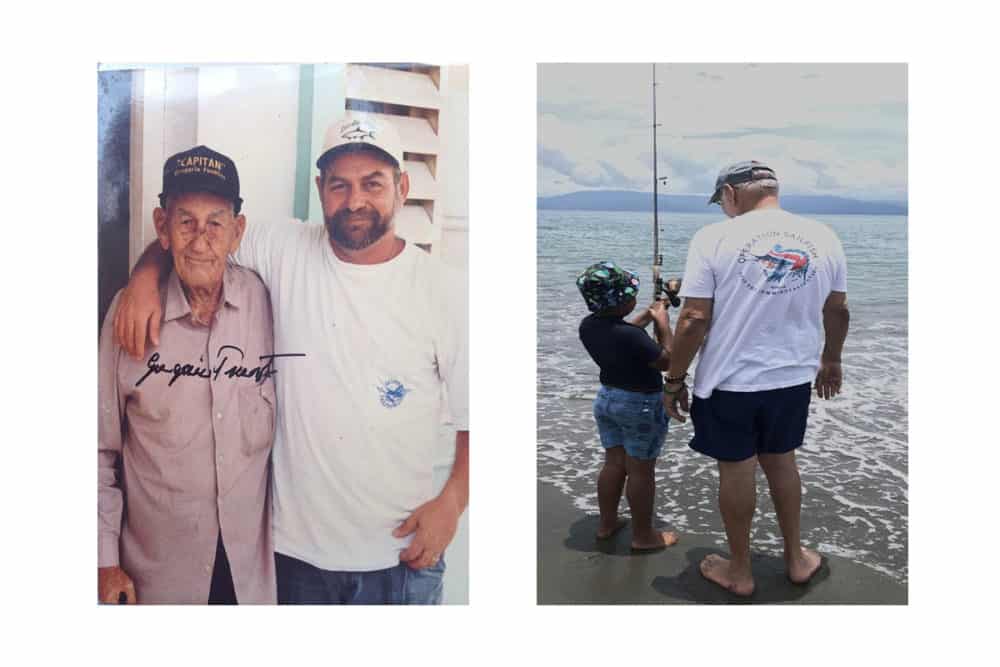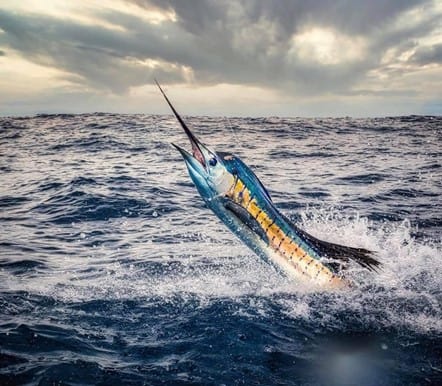I´m in my mid-thirties living in the Caribbean jungle of Costa Rica and I pass my days pulling on 100 pound plus tarpon, or balancing in the pounding surf, casting for snook all day in a scorching sun while occasionally an unseen piece of driftwood painfully crashes into my shins nearly taking me out.
Eventually I move over to the Pacific side of the country and target sailfish, lug it out with big tuna, or play tug a war with a 400 pound marlin as I wire the leader. All with enough energy left at the end of the day to pound a few cold ones with the clients and get up early the next day to it all over again.
I close my eyes for what seems like a couple of seconds and when I open them, I´m pushing 70, everything aches as I step out of bed, my beard is snow white, and my skin is leathered from not listening to the sun screen advice I have heard for years. I am sure I am not the first old fart to feel this way. How quickly time passes.
My house is usually loaded with grandkids that call me “Papi Pesca,” because of all the fishing memorabilia gathered over the years. I have taught them all to fish, always making trips where we release everything to get accustomed to catch and release and later taking fish home to eat. I encourage them to fish, play football, or just draw fish pictures. Anything to keep the electronic prison out their hand that they start learning how to use almost before they can walk.
I have been blessed to have a Hemingway style of life. At least the fishing part of his life. He was a great writer, I am a mediocre writer, but our love and passion for the sea is equal. So was our taste for Cuban rum and pretty Latin women. In the mid-nineties I worked for a man who kept his boat in Hemmingway marina outside of Havana and for a couple of years I would make monthly or bi-monthly trips to check the boat.
Each trip I would go to Cojimar, Cuba where Hemingway kept the Pilar, his boat and visit Gregorio Fuentes who was Hemingway´s captain. He would invite me in his house and we would spend hours talking fishing and Hemmingway. Gregorio was 100 years old at the time and passed at 104.

My favorite Hemingway quote is:
There is nothing noble in being superior to your fellow men. True nobility lies in being superior to your former self.
Of course it becomes easier to accomplish this with age and maturity. One begins to ask himself what your legacy will be. I am hoping mine will be to pass on my love and respect for the ocean to others.
So with that thought in mind this fisherman is about to open a can of worms once again and maybe even ruffle some feathers by jotting down some opinions. The government changes in a few weeks and Rodrigo Chaves will start his term as president of Costa Rica. He will make many appointments to head up different parts of the government. Most will change from the current government while others may remain the same. Other groups are non-governmental.
The Sport Fishing group includes recreational and charter fishing groups. It is time we wake up. We are a poorly organized and apathetic bunch. Those that have been here long enough know how the fishing, especially for sailfish has declined. We remember when Costa Rica was called the “Sailfish Capital of the World,” and raising 15 to 20 fish a day was common. We see firsthand what is happening and how now half that number is considered a really exceptional day.
In the last decade, sailfish up in the teasers of sport fishing boats chasing lures has in a catch and release fishery, declined between 60 and 70 percent while the commercial harvest of dead sailfish has risen by 126%. How can the numbers be down for one sector and up so high for another. The difference is how they fish. Sport fishermen are trolling, attracting the fish to chase the teasers while the commercial fleet soaks bait for hours on lines with hundreds of hooks.
Costa Rica has the least regulations for sailfish than any other Central American country. A campaign has been started to promote the prohibition of the commercialization of sailfish in Costa Rica. Currently it prohibited to export sailfish but it can be sold for consumption on the National market.
We have made the mistake of accepting low numbers as the new normal and the new normal will keep getting smaller and smaller until it is nearly gone. Rather than just talk about it, take some action. Join a fishing group. Numbers are heard. Many think the way the five fish per boat limit of eating fish for sport boats was poorly done, than together lobby to change it. Incopesca (the government agency that regulates fishing) has a sport fishing commission.
They are an advisory group with no real power but they were designed to represent sport fishing and be the conduit between the sport fishing sector and the government.
The Sport Fishing Commission has been around since 2011 but probably many in the sport fishing sector does not even know it exists. Although their claim is to represent the entire sport fishing sector, they haven’t done a great job communicating with them. Hebert Nanne is a charter member of the Sport Fishing Commission and has served on the commission many years. He recently spoke to the Club Amateur de Pesca about the sailfish issue.
His suggestion was to continue to use the methods put in place for the last decade but have yet to control the depletion of the resource. Then finally he said that if the sport fishing sector goes for a complete commercial ban on sailfish the longline fleet will be angry.
He should know better than anyone the business of marketing and protecting sailfish as he has been on both sides of the fence. When he was director of Incopesca, the commercial fleet was landing 125,000 kilos, (around 5700 sailfish) per month in Quepos according to a published report.
He later became the Central American representative for The Billfish Foundation, a conservation group and currently serves on the Sport Fishing Commission. Probably no one knows both sides of this issue like him but if he or anyone serving on the Sport Fishing Commission chooses to serve they need to be 100% behind the sport fishing group lobbying for the sport fishermen and the resource.
Minister of Agriculture and Incopesca will probably have new leaders with the new government. Fishing falls under this leadership. What the new leadership needs to remember is unlike coffee, bananas, rice, or other crops where farmers plant, care for and then harvest, commercial fishermen only harvest.
There needs to be a good management plan put in place that considers the importance of all fishing sectors to the country that also allows each sector to operate without conflicts with the other. On Wednesday April, 20th the Environmental Committee of congress voted to move tuna purse seine boats out 80 miles from the coast.
This must now go through the next step which hopefully will be voted on by the current congress if not by the new appointed congress after it takes office in May. Since tuna boats have been a thorn in the side of both sport and commercial fishermen it is somewhat of a win for both.
Assuming the new tuna law passes, and one never knows. It has been kicked around in congress the last two years. It gives a good size area free of purse seiners that if properly managed could solve lot of problems by the new minister and Incopesca zoning the ocean. The first 40 miles or so could be reserved for only sport or selected types of commercial fishing that offer little or no bycatch like greenstick fishing for tuna. Beyond that permit longline fishing. That would separate the fleets and allow everyone to prosper.
The ICT (Costa Rican Tourist Board) will have a new minister. Historically the ICT has thought of sport fishing as “Rich Boys with Expensive Toys”, because they only think about what is parked in the marinas. In fact the ICT has passed off sport fishing to CIMAT division which regulates marinas and docks.
These multi-million dollar vessels are an important part of the $520 million generated annually to the gross national product of Costa Rica by sport fishing, but only a part. That is liken to say all hotels in the country are Four Seasons or Hiltons when just like there are many small privately owned hotels there are small sport fishing operations owned by Costa Ricans that struggle to get by. ICT puts more effort in promoting the cruise ship industry which generates around $9 million a year than sport fishing that generates $520 million.
The Minister of Tourism in Guatemala seeing how much was being generated in Costa Rica by sport fishing took the bull by the horns and lobbied the government to protect sailfish a few years ago. Once considered a sketchy place to visit, Guatemala is now attracting record numbers of anglers because of the amounts of catch and release sailfish available with no commercial pressure. Many of those tourists were regulars to Costa Rica.
It is time Costa Rica does the same.






